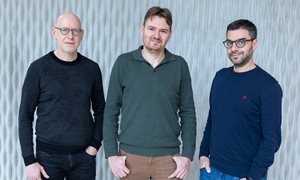
Neurologist Wim Mulleners has been named as professor by special appointment in Neurology, in particular headache and facial pain at Radboud university medical center / Radboud University. Mulleners works at Canisius Wilhelmina Hospital (CWZ) in Nijmegen, where the STZ Center of Expertise for Headache and Facial Pain focuses on the diagnosis and management of headache in general and cluster headache in particular. With this appointment, Radboud university medical center and CWZ are consolidating their close collaboration in the field of these disorders.
Cluster headache is rare, and is characterized by extremely severe pain attacks. These attacks can recur daily for months, and sometimes even occur chronically. A condition with a major impact, says Wim Mulleners. 'The attacks range from fifteen minutes to three hours duration; they can occur up to eight times a day. Even at night. The consequences for people with this condition are great. Think of sleep deprivation and absenteeism. Moreover, the pain is really intense, people suffer tremendously during such an attack.'
Nerve stimulation
The pain is perceived on one side of the head or face and is caused by activation of a cranial nerve and its associated area in the brain stem. Drug treatment is usually indicated. If this fails, some patients are eligible for stimulation of certain nerves, occipital nerve stimulation (ONS). In the ONS procedure, the neurosurgeon implants a small nerve stimulator under the skin, at the back of the head near the occipital nerve. This procedure gives good results, according to Mulleners: 'We have demonstrated the efficacy of occipital nerve stimulation in chronic cluster headaches. The number and severity of headache attacks decrease drastically. Some patients even become attack-free. CWZ is one of the three hospitals in the Netherlands that offer this procedure.'
Another form of nerve modulation is a blockade of the sphenopalatine ganglion. The pain specialist treats a nerve in the face, which is located next to the maxillary cavity behind the nose. This procedure is performed at Radboud university medical center. The collaboration between Radboud university medical center and CWZ is perpetuated with this chair, says Mulleners. 'We are already working together in interventions, but with this step we will conduct more joint research. We want to better map the effectiveness and mechanism of action of occipital nerve stimulation and sphenopalatinum blockade for cluster headaches. Why does this procedure work for many people? With more knowledge, we can optimize these innovative therapies.'
Wim Mulleners' chair also contains two other fields of research. Again, in a collaboration between Radboud university medical center and CWZ, among others, he will research the effect of low doses of psychedelics as a medicine for chronic cluster headaches. He hopes to start in 2024. Finally, his research focuses on improving access to care for headache patients. 'We need to focus on the individual demand of the patient. This requires appointments and cooperation with general practitioners and other healthcare providers. We also need to look at digitalization. We want to roll out our ideas regionally and test them for effectiveness, quality and efficiency. Because the care for patients with headaches can and must be improved.'
Career
Wim Mulleners studied Medicine in Utrecht and obtained his PhD for research into migraine and an excitable brain (title thesis: Exciting excitable brains – a transcranial magnetic stimulation study in migraine). He trained as a neurologist in CWZ, after which he worked for several years as a medical specialist in Heerlen. He has been working in CWZ since 2003 and heads the STZ Expertise Center for Headache and Facial Pain. He is also chairman of the Dutch Headache Society. His appointment as professor by special appointment in Neurology, in particular headache and facial pain, took effect on 1 October 2023 and is valid for a period of three years.
-
Want to know more about these subjects? Click on the buttons below for more news.
More information
Pauline Dekhuijzen

wetenschaps- en persvoorlichter





